Total Quality Management Report: Seven Events Company Analysis
VerifiedAdded on 2020/04/21
|15
|2717
|108
Report
AI Summary
This report provides a comprehensive analysis of Total Quality Management (TQM) within the event sector, specifically examining the case of Seven Events, a UK-based company. The report begins with an introduction to TQM, highlighting its importance in reducing errors and improving organizational efficiency, particularly in enhancing customer satisfaction. It then delves into the Total Product Concept (TPC), a key TQM tool, and its application to Seven Events. The analysis breaks down the TPC into its three dimensions: core product, expected product, and augmented product, illustrating how Seven Events implements each aspect to meet customer needs and gain a competitive edge. The report also identifies potential risks associated with the TPC implementation and suggests mitigation strategies. Finally, the report concludes with recommendations for Seven Events, emphasizing the importance of integrating marketing and advertising strategies along with TQM tools to achieve greater success in the target market. The report references various academic sources to support its arguments and findings.
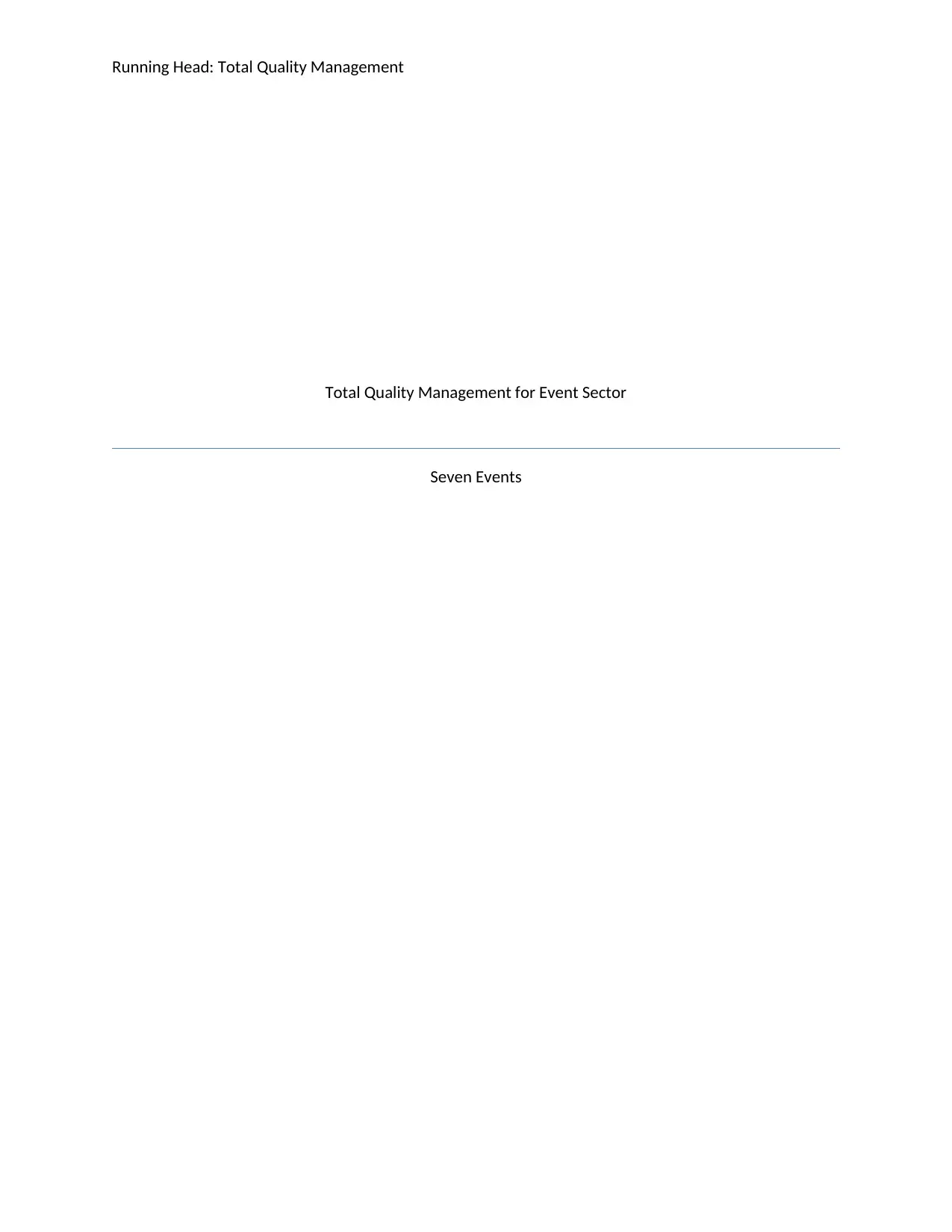
Running Head: Total Quality Management
Total Quality Management for Event Sector
Seven Events
Total Quality Management for Event Sector
Seven Events
Paraphrase This Document
Need a fresh take? Get an instant paraphrase of this document with our AI Paraphraser
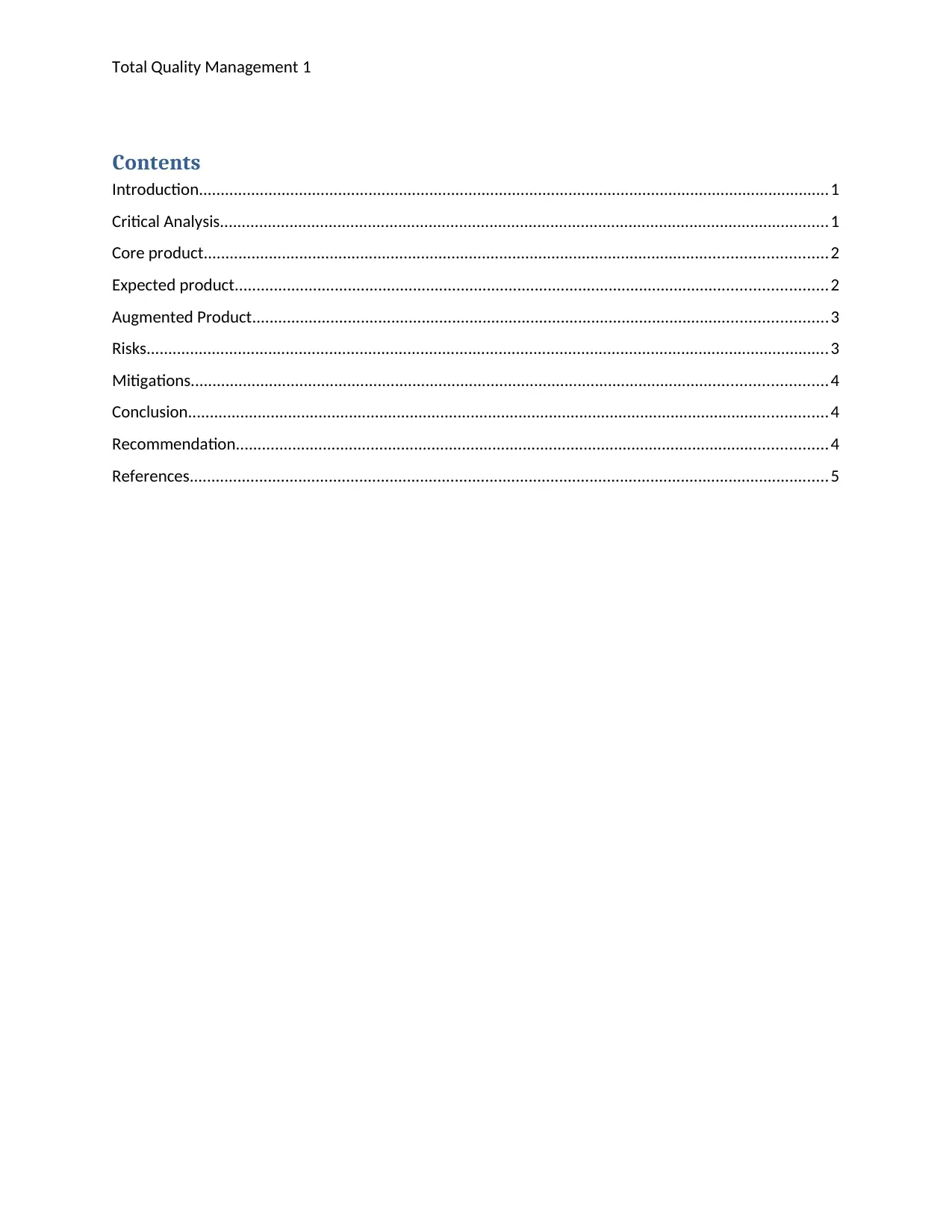
Total Quality Management 1
Contents
Introduction.................................................................................................................................................1
Critical Analysis............................................................................................................................................1
Core product...............................................................................................................................................2
Expected product........................................................................................................................................2
Augmented Product....................................................................................................................................3
Risks.............................................................................................................................................................3
Mitigations..................................................................................................................................................4
Conclusion...................................................................................................................................................4
Recommendation........................................................................................................................................4
References...................................................................................................................................................5
Contents
Introduction.................................................................................................................................................1
Critical Analysis............................................................................................................................................1
Core product...............................................................................................................................................2
Expected product........................................................................................................................................2
Augmented Product....................................................................................................................................3
Risks.............................................................................................................................................................3
Mitigations..................................................................................................................................................4
Conclusion...................................................................................................................................................4
Recommendation........................................................................................................................................4
References...................................................................................................................................................5
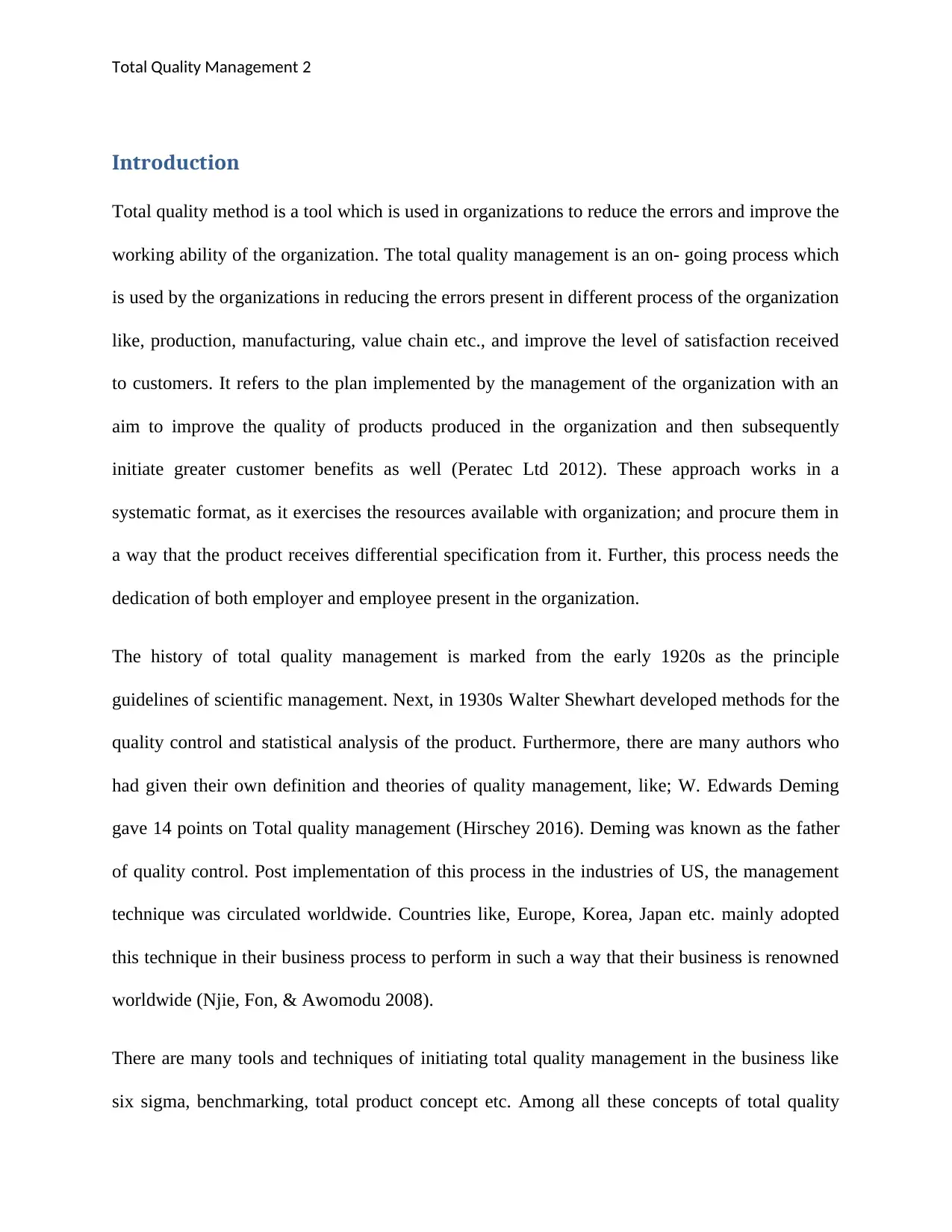
Total Quality Management 2
Introduction
Total quality method is a tool which is used in organizations to reduce the errors and improve the
working ability of the organization. The total quality management is an on- going process which
is used by the organizations in reducing the errors present in different process of the organization
like, production, manufacturing, value chain etc., and improve the level of satisfaction received
to customers. It refers to the plan implemented by the management of the organization with an
aim to improve the quality of products produced in the organization and then subsequently
initiate greater customer benefits as well (Peratec Ltd 2012). These approach works in a
systematic format, as it exercises the resources available with organization; and procure them in
a way that the product receives differential specification from it. Further, this process needs the
dedication of both employer and employee present in the organization.
The history of total quality management is marked from the early 1920s as the principle
guidelines of scientific management. Next, in 1930s Walter Shewhart developed methods for the
quality control and statistical analysis of the product. Furthermore, there are many authors who
had given their own definition and theories of quality management, like; W. Edwards Deming
gave 14 points on Total quality management (Hirschey 2016). Deming was known as the father
of quality control. Post implementation of this process in the industries of US, the management
technique was circulated worldwide. Countries like, Europe, Korea, Japan etc. mainly adopted
this technique in their business process to perform in such a way that their business is renowned
worldwide (Njie, Fon, & Awomodu 2008).
There are many tools and techniques of initiating total quality management in the business like
six sigma, benchmarking, total product concept etc. Among all these concepts of total quality
Introduction
Total quality method is a tool which is used in organizations to reduce the errors and improve the
working ability of the organization. The total quality management is an on- going process which
is used by the organizations in reducing the errors present in different process of the organization
like, production, manufacturing, value chain etc., and improve the level of satisfaction received
to customers. It refers to the plan implemented by the management of the organization with an
aim to improve the quality of products produced in the organization and then subsequently
initiate greater customer benefits as well (Peratec Ltd 2012). These approach works in a
systematic format, as it exercises the resources available with organization; and procure them in
a way that the product receives differential specification from it. Further, this process needs the
dedication of both employer and employee present in the organization.
The history of total quality management is marked from the early 1920s as the principle
guidelines of scientific management. Next, in 1930s Walter Shewhart developed methods for the
quality control and statistical analysis of the product. Furthermore, there are many authors who
had given their own definition and theories of quality management, like; W. Edwards Deming
gave 14 points on Total quality management (Hirschey 2016). Deming was known as the father
of quality control. Post implementation of this process in the industries of US, the management
technique was circulated worldwide. Countries like, Europe, Korea, Japan etc. mainly adopted
this technique in their business process to perform in such a way that their business is renowned
worldwide (Njie, Fon, & Awomodu 2008).
There are many tools and techniques of initiating total quality management in the business like
six sigma, benchmarking, total product concept etc. Among all these concepts of total quality
⊘ This is a preview!⊘
Do you want full access?
Subscribe today to unlock all pages.

Trusted by 1+ million students worldwide
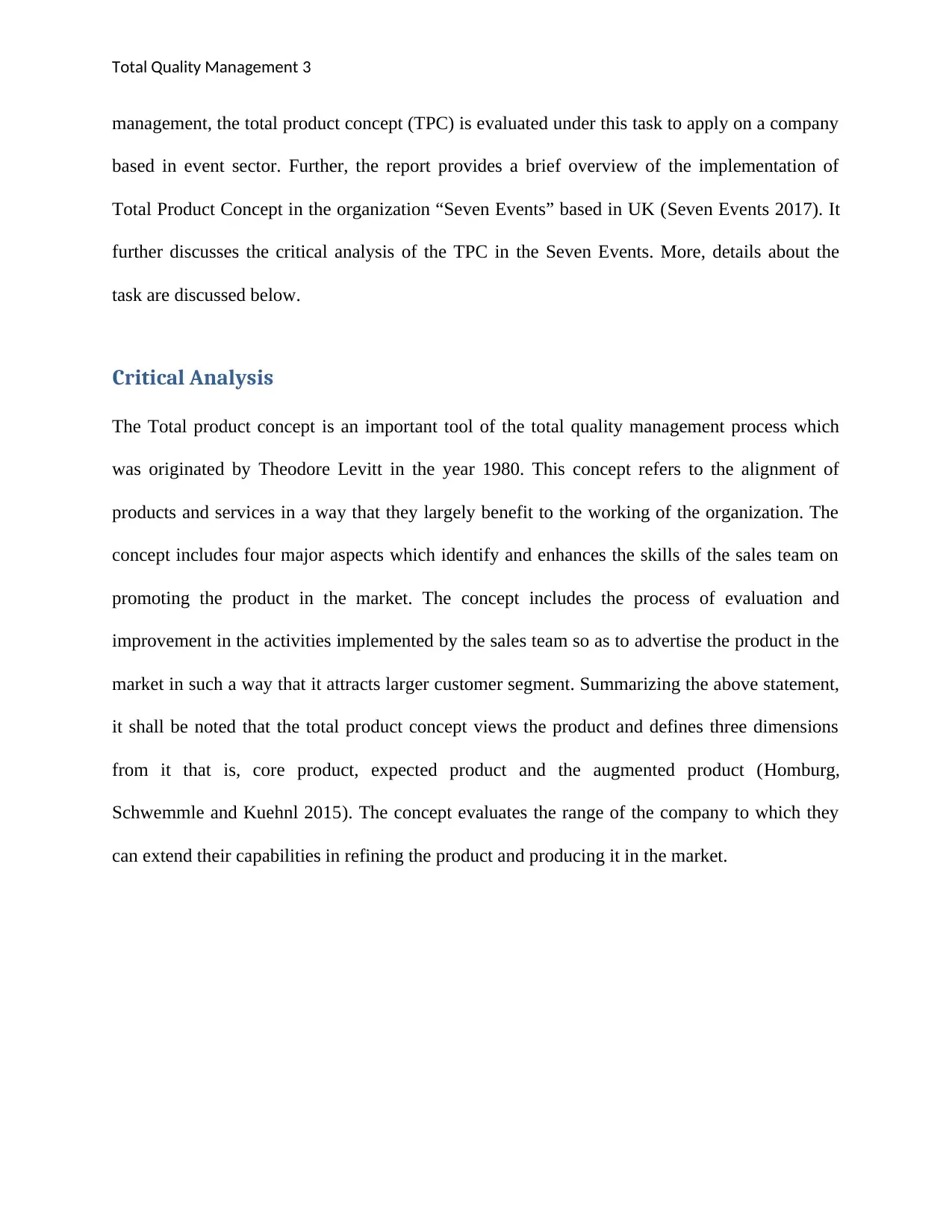
Total Quality Management 3
management, the total product concept (TPC) is evaluated under this task to apply on a company
based in event sector. Further, the report provides a brief overview of the implementation of
Total Product Concept in the organization “Seven Events” based in UK (Seven Events 2017). It
further discusses the critical analysis of the TPC in the Seven Events. More, details about the
task are discussed below.
Critical Analysis
The Total product concept is an important tool of the total quality management process which
was originated by Theodore Levitt in the year 1980. This concept refers to the alignment of
products and services in a way that they largely benefit to the working of the organization. The
concept includes four major aspects which identify and enhances the skills of the sales team on
promoting the product in the market. The concept includes the process of evaluation and
improvement in the activities implemented by the sales team so as to advertise the product in the
market in such a way that it attracts larger customer segment. Summarizing the above statement,
it shall be noted that the total product concept views the product and defines three dimensions
from it that is, core product, expected product and the augmented product (Homburg,
Schwemmle and Kuehnl 2015). The concept evaluates the range of the company to which they
can extend their capabilities in refining the product and producing it in the market.
management, the total product concept (TPC) is evaluated under this task to apply on a company
based in event sector. Further, the report provides a brief overview of the implementation of
Total Product Concept in the organization “Seven Events” based in UK (Seven Events 2017). It
further discusses the critical analysis of the TPC in the Seven Events. More, details about the
task are discussed below.
Critical Analysis
The Total product concept is an important tool of the total quality management process which
was originated by Theodore Levitt in the year 1980. This concept refers to the alignment of
products and services in a way that they largely benefit to the working of the organization. The
concept includes four major aspects which identify and enhances the skills of the sales team on
promoting the product in the market. The concept includes the process of evaluation and
improvement in the activities implemented by the sales team so as to advertise the product in the
market in such a way that it attracts larger customer segment. Summarizing the above statement,
it shall be noted that the total product concept views the product and defines three dimensions
from it that is, core product, expected product and the augmented product (Homburg,
Schwemmle and Kuehnl 2015). The concept evaluates the range of the company to which they
can extend their capabilities in refining the product and producing it in the market.
Paraphrase This Document
Need a fresh take? Get an instant paraphrase of this document with our AI Paraphraser
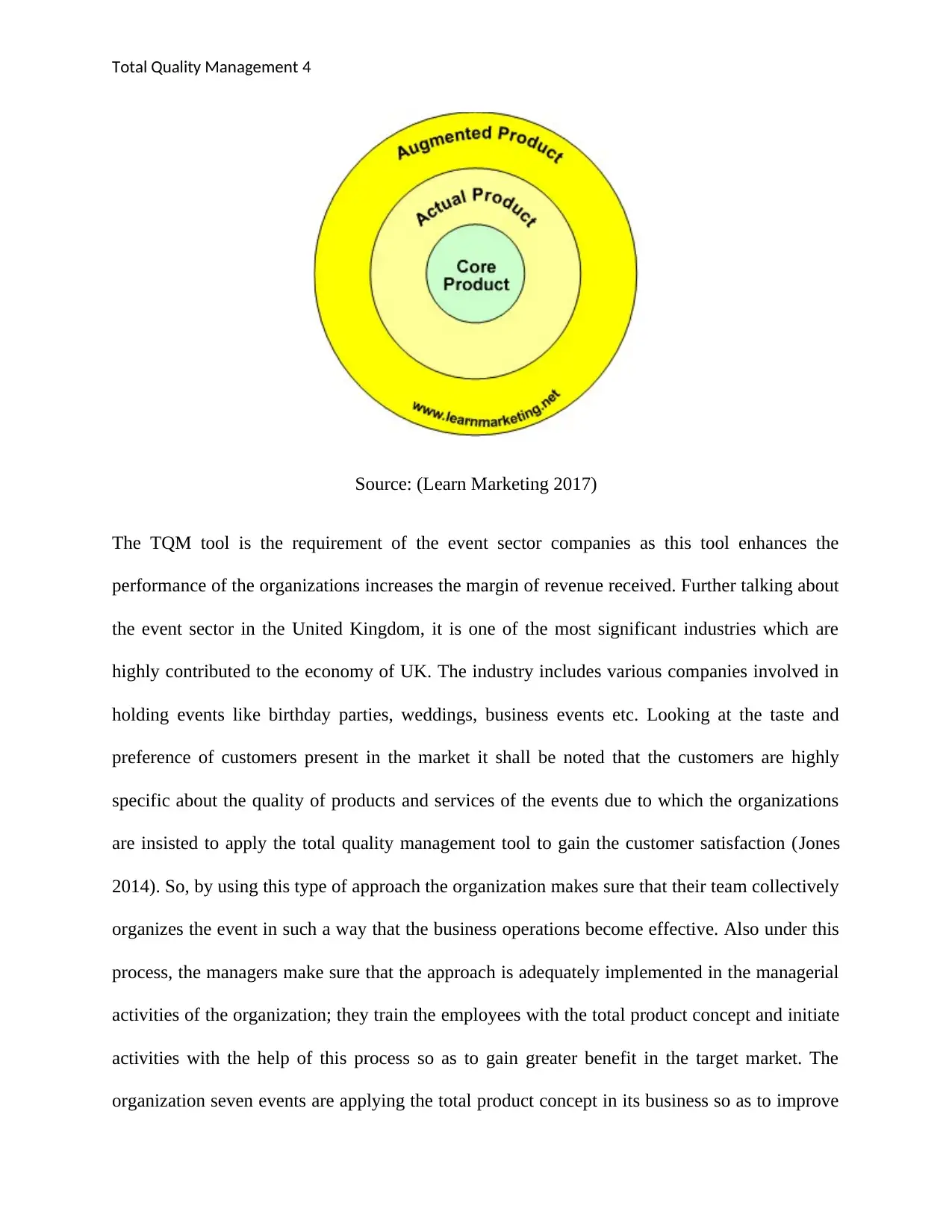
Total Quality Management 4
Source: (Learn Marketing 2017)
The TQM tool is the requirement of the event sector companies as this tool enhances the
performance of the organizations increases the margin of revenue received. Further talking about
the event sector in the United Kingdom, it is one of the most significant industries which are
highly contributed to the economy of UK. The industry includes various companies involved in
holding events like birthday parties, weddings, business events etc. Looking at the taste and
preference of customers present in the market it shall be noted that the customers are highly
specific about the quality of products and services of the events due to which the organizations
are insisted to apply the total quality management tool to gain the customer satisfaction (Jones
2014). So, by using this type of approach the organization makes sure that their team collectively
organizes the event in such a way that the business operations become effective. Also under this
process, the managers make sure that the approach is adequately implemented in the managerial
activities of the organization; they train the employees with the total product concept and initiate
activities with the help of this process so as to gain greater benefit in the target market. The
organization seven events are applying the total product concept in its business so as to improve
Source: (Learn Marketing 2017)
The TQM tool is the requirement of the event sector companies as this tool enhances the
performance of the organizations increases the margin of revenue received. Further talking about
the event sector in the United Kingdom, it is one of the most significant industries which are
highly contributed to the economy of UK. The industry includes various companies involved in
holding events like birthday parties, weddings, business events etc. Looking at the taste and
preference of customers present in the market it shall be noted that the customers are highly
specific about the quality of products and services of the events due to which the organizations
are insisted to apply the total quality management tool to gain the customer satisfaction (Jones
2014). So, by using this type of approach the organization makes sure that their team collectively
organizes the event in such a way that the business operations become effective. Also under this
process, the managers make sure that the approach is adequately implemented in the managerial
activities of the organization; they train the employees with the total product concept and initiate
activities with the help of this process so as to gain greater benefit in the target market. The
organization seven events are applying the total product concept in its business so as to improve
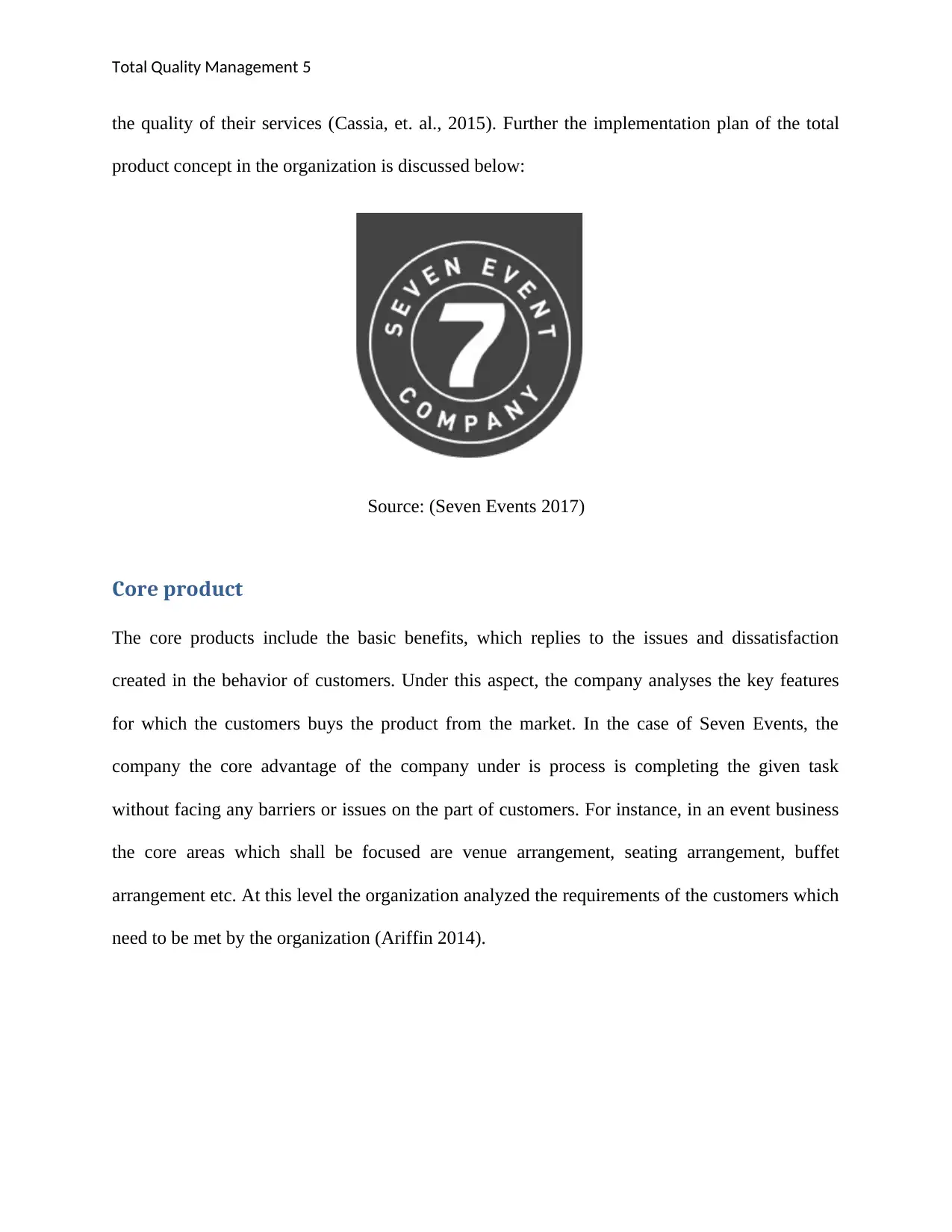
Total Quality Management 5
the quality of their services (Cassia, et. al., 2015). Further the implementation plan of the total
product concept in the organization is discussed below:
Source: (Seven Events 2017)
Core product
The core products include the basic benefits, which replies to the issues and dissatisfaction
created in the behavior of customers. Under this aspect, the company analyses the key features
for which the customers buys the product from the market. In the case of Seven Events, the
company the core advantage of the company under is process is completing the given task
without facing any barriers or issues on the part of customers. For instance, in an event business
the core areas which shall be focused are venue arrangement, seating arrangement, buffet
arrangement etc. At this level the organization analyzed the requirements of the customers which
need to be met by the organization (Ariffin 2014).
the quality of their services (Cassia, et. al., 2015). Further the implementation plan of the total
product concept in the organization is discussed below:
Source: (Seven Events 2017)
Core product
The core products include the basic benefits, which replies to the issues and dissatisfaction
created in the behavior of customers. Under this aspect, the company analyses the key features
for which the customers buys the product from the market. In the case of Seven Events, the
company the core advantage of the company under is process is completing the given task
without facing any barriers or issues on the part of customers. For instance, in an event business
the core areas which shall be focused are venue arrangement, seating arrangement, buffet
arrangement etc. At this level the organization analyzed the requirements of the customers which
need to be met by the organization (Ariffin 2014).
⊘ This is a preview!⊘
Do you want full access?
Subscribe today to unlock all pages.

Trusted by 1+ million students worldwide
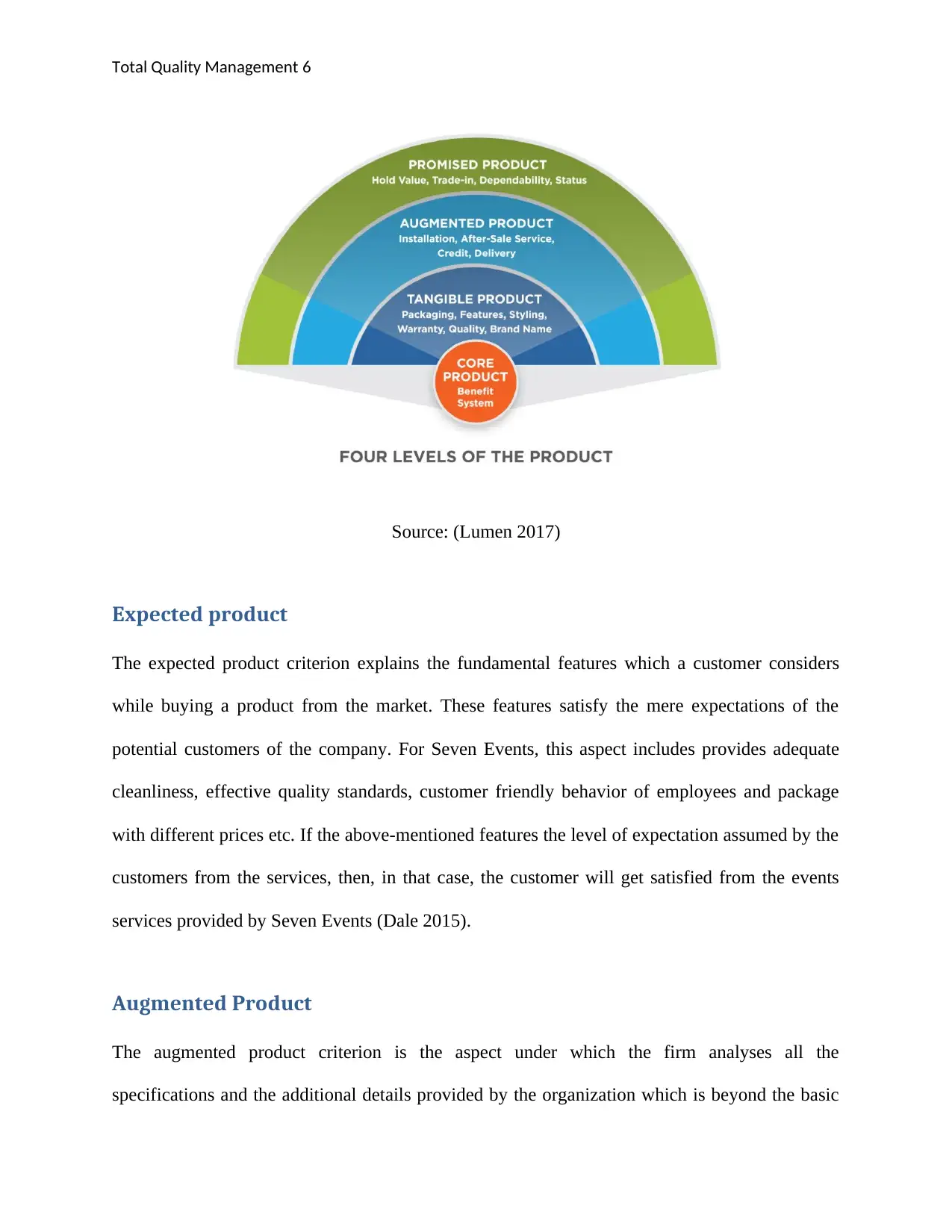
Total Quality Management 6
Source: (Lumen 2017)
Expected product
The expected product criterion explains the fundamental features which a customer considers
while buying a product from the market. These features satisfy the mere expectations of the
potential customers of the company. For Seven Events, this aspect includes provides adequate
cleanliness, effective quality standards, customer friendly behavior of employees and package
with different prices etc. If the above-mentioned features the level of expectation assumed by the
customers from the services, then, in that case, the customer will get satisfied from the events
services provided by Seven Events (Dale 2015).
Augmented Product
The augmented product criterion is the aspect under which the firm analyses all the
specifications and the additional details provided by the organization which is beyond the basic
Source: (Lumen 2017)
Expected product
The expected product criterion explains the fundamental features which a customer considers
while buying a product from the market. These features satisfy the mere expectations of the
potential customers of the company. For Seven Events, this aspect includes provides adequate
cleanliness, effective quality standards, customer friendly behavior of employees and package
with different prices etc. If the above-mentioned features the level of expectation assumed by the
customers from the services, then, in that case, the customer will get satisfied from the events
services provided by Seven Events (Dale 2015).
Augmented Product
The augmented product criterion is the aspect under which the firm analyses all the
specifications and the additional details provided by the organization which is beyond the basic
Paraphrase This Document
Need a fresh take? Get an instant paraphrase of this document with our AI Paraphraser
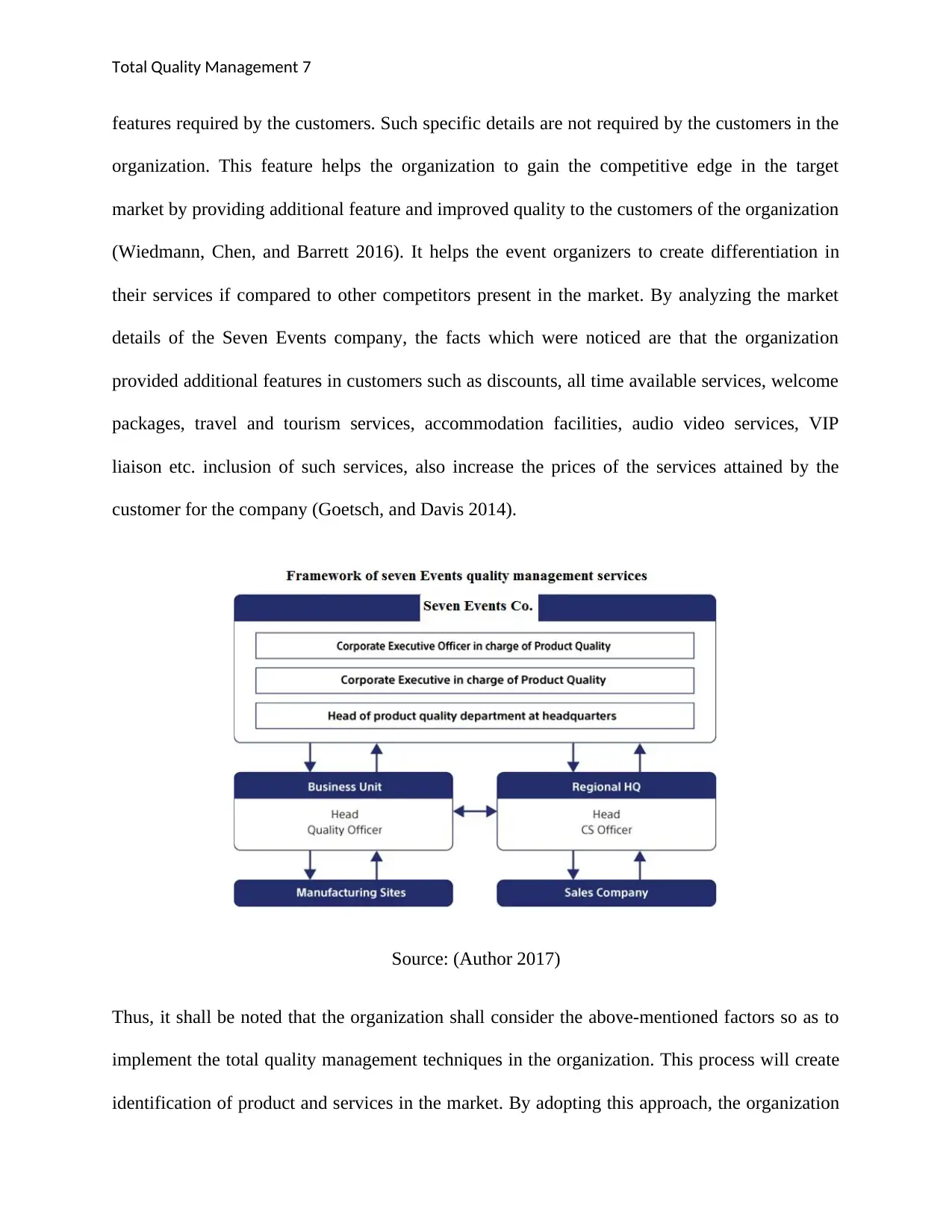
Total Quality Management 7
features required by the customers. Such specific details are not required by the customers in the
organization. This feature helps the organization to gain the competitive edge in the target
market by providing additional feature and improved quality to the customers of the organization
(Wiedmann, Chen, and Barrett 2016). It helps the event organizers to create differentiation in
their services if compared to other competitors present in the market. By analyzing the market
details of the Seven Events company, the facts which were noticed are that the organization
provided additional features in customers such as discounts, all time available services, welcome
packages, travel and tourism services, accommodation facilities, audio video services, VIP
liaison etc. inclusion of such services, also increase the prices of the services attained by the
customer for the company (Goetsch, and Davis 2014).
Source: (Author 2017)
Thus, it shall be noted that the organization shall consider the above-mentioned factors so as to
implement the total quality management techniques in the organization. This process will create
identification of product and services in the market. By adopting this approach, the organization
features required by the customers. Such specific details are not required by the customers in the
organization. This feature helps the organization to gain the competitive edge in the target
market by providing additional feature and improved quality to the customers of the organization
(Wiedmann, Chen, and Barrett 2016). It helps the event organizers to create differentiation in
their services if compared to other competitors present in the market. By analyzing the market
details of the Seven Events company, the facts which were noticed are that the organization
provided additional features in customers such as discounts, all time available services, welcome
packages, travel and tourism services, accommodation facilities, audio video services, VIP
liaison etc. inclusion of such services, also increase the prices of the services attained by the
customer for the company (Goetsch, and Davis 2014).
Source: (Author 2017)
Thus, it shall be noted that the organization shall consider the above-mentioned factors so as to
implement the total quality management techniques in the organization. This process will create
identification of product and services in the market. By adopting this approach, the organization
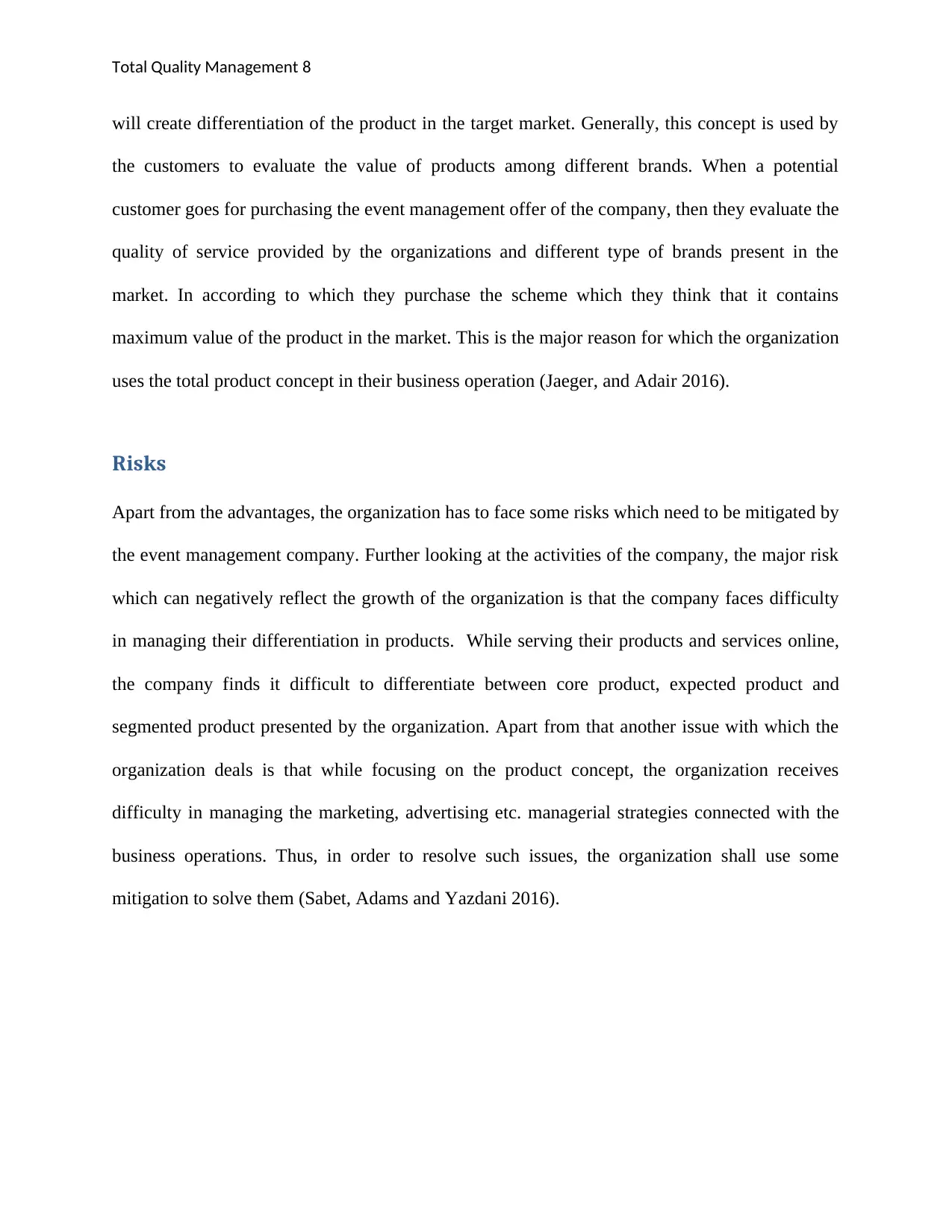
Total Quality Management 8
will create differentiation of the product in the target market. Generally, this concept is used by
the customers to evaluate the value of products among different brands. When a potential
customer goes for purchasing the event management offer of the company, then they evaluate the
quality of service provided by the organizations and different type of brands present in the
market. In according to which they purchase the scheme which they think that it contains
maximum value of the product in the market. This is the major reason for which the organization
uses the total product concept in their business operation (Jaeger, and Adair 2016).
Risks
Apart from the advantages, the organization has to face some risks which need to be mitigated by
the event management company. Further looking at the activities of the company, the major risk
which can negatively reflect the growth of the organization is that the company faces difficulty
in managing their differentiation in products. While serving their products and services online,
the company finds it difficult to differentiate between core product, expected product and
segmented product presented by the organization. Apart from that another issue with which the
organization deals is that while focusing on the product concept, the organization receives
difficulty in managing the marketing, advertising etc. managerial strategies connected with the
business operations. Thus, in order to resolve such issues, the organization shall use some
mitigation to solve them (Sabet, Adams and Yazdani 2016).
will create differentiation of the product in the target market. Generally, this concept is used by
the customers to evaluate the value of products among different brands. When a potential
customer goes for purchasing the event management offer of the company, then they evaluate the
quality of service provided by the organizations and different type of brands present in the
market. In according to which they purchase the scheme which they think that it contains
maximum value of the product in the market. This is the major reason for which the organization
uses the total product concept in their business operation (Jaeger, and Adair 2016).
Risks
Apart from the advantages, the organization has to face some risks which need to be mitigated by
the event management company. Further looking at the activities of the company, the major risk
which can negatively reflect the growth of the organization is that the company faces difficulty
in managing their differentiation in products. While serving their products and services online,
the company finds it difficult to differentiate between core product, expected product and
segmented product presented by the organization. Apart from that another issue with which the
organization deals is that while focusing on the product concept, the organization receives
difficulty in managing the marketing, advertising etc. managerial strategies connected with the
business operations. Thus, in order to resolve such issues, the organization shall use some
mitigation to solve them (Sabet, Adams and Yazdani 2016).
⊘ This is a preview!⊘
Do you want full access?
Subscribe today to unlock all pages.

Trusted by 1+ million students worldwide
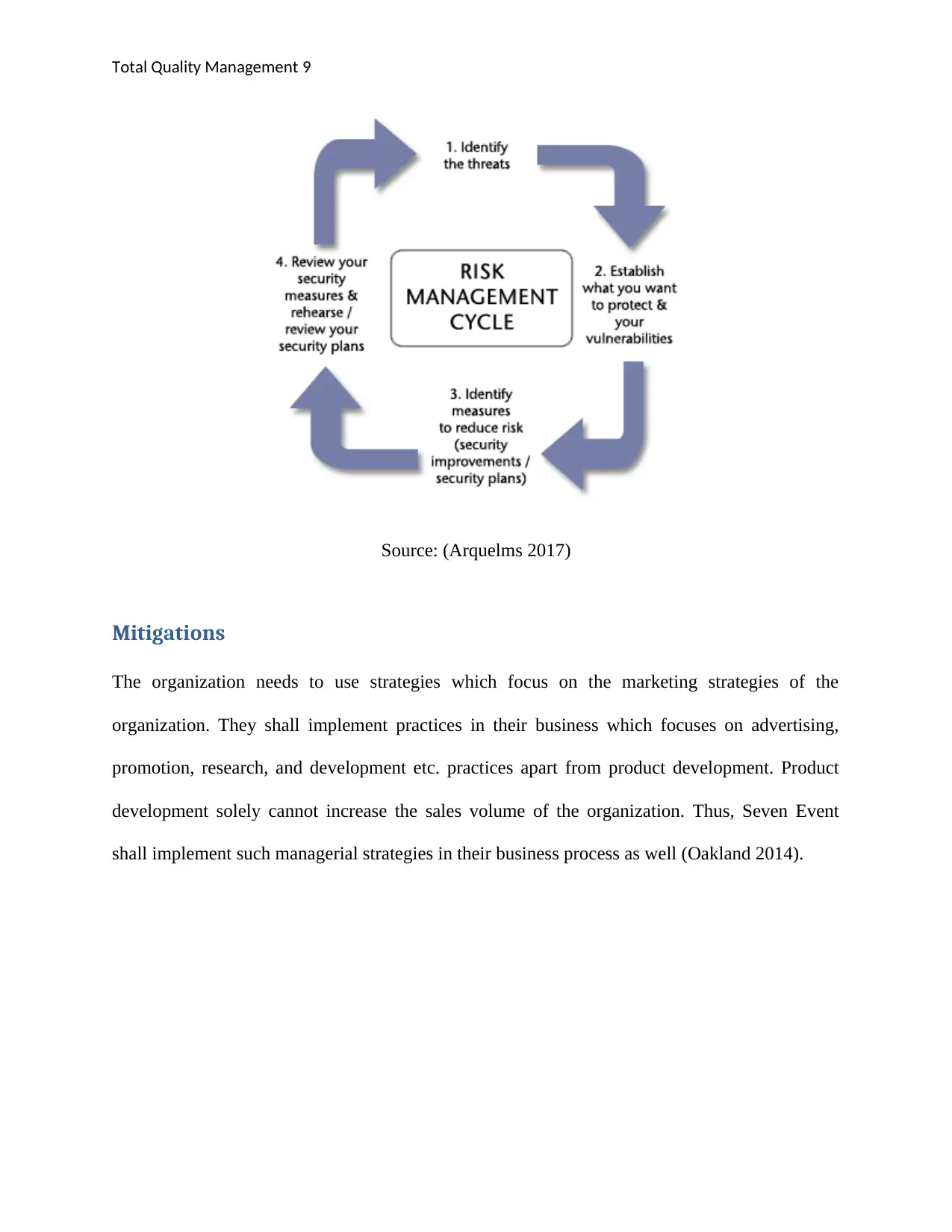
Total Quality Management 9
Source: (Arquelms 2017)
Mitigations
The organization needs to use strategies which focus on the marketing strategies of the
organization. They shall implement practices in their business which focuses on advertising,
promotion, research, and development etc. practices apart from product development. Product
development solely cannot increase the sales volume of the organization. Thus, Seven Event
shall implement such managerial strategies in their business process as well (Oakland 2014).
Source: (Arquelms 2017)
Mitigations
The organization needs to use strategies which focus on the marketing strategies of the
organization. They shall implement practices in their business which focuses on advertising,
promotion, research, and development etc. practices apart from product development. Product
development solely cannot increase the sales volume of the organization. Thus, Seven Event
shall implement such managerial strategies in their business process as well (Oakland 2014).
Paraphrase This Document
Need a fresh take? Get an instant paraphrase of this document with our AI Paraphraser
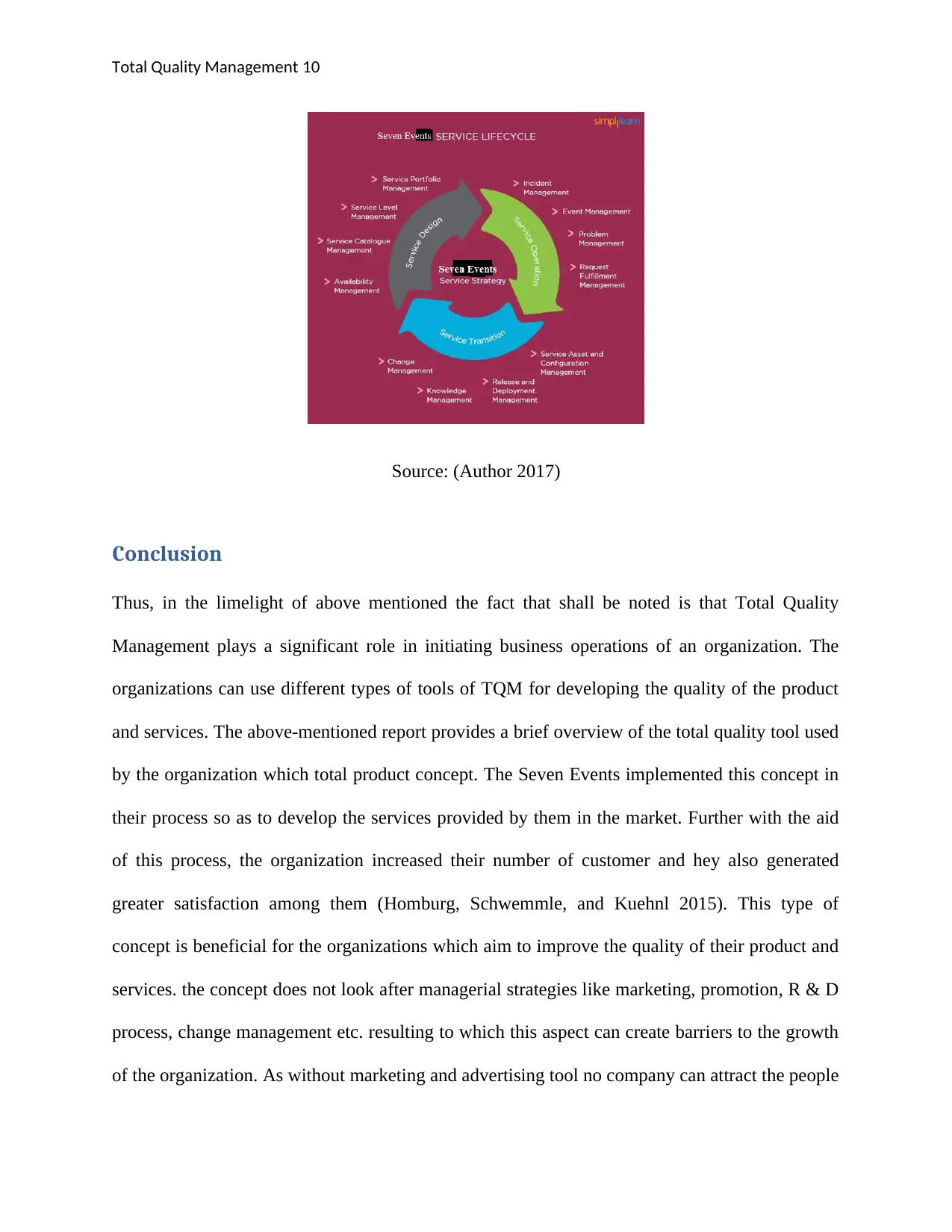
Total Quality Management 10
Source: (Author 2017)
Conclusion
Thus, in the limelight of above mentioned the fact that shall be noted is that Total Quality
Management plays a significant role in initiating business operations of an organization. The
organizations can use different types of tools of TQM for developing the quality of the product
and services. The above-mentioned report provides a brief overview of the total quality tool used
by the organization which total product concept. The Seven Events implemented this concept in
their process so as to develop the services provided by them in the market. Further with the aid
of this process, the organization increased their number of customer and hey also generated
greater satisfaction among them (Homburg, Schwemmle, and Kuehnl 2015). This type of
concept is beneficial for the organizations which aim to improve the quality of their product and
services. the concept does not look after managerial strategies like marketing, promotion, R & D
process, change management etc. resulting to which this aspect can create barriers to the growth
of the organization. As without marketing and advertising tool no company can attract the people
Source: (Author 2017)
Conclusion
Thus, in the limelight of above mentioned the fact that shall be noted is that Total Quality
Management plays a significant role in initiating business operations of an organization. The
organizations can use different types of tools of TQM for developing the quality of the product
and services. The above-mentioned report provides a brief overview of the total quality tool used
by the organization which total product concept. The Seven Events implemented this concept in
their process so as to develop the services provided by them in the market. Further with the aid
of this process, the organization increased their number of customer and hey also generated
greater satisfaction among them (Homburg, Schwemmle, and Kuehnl 2015). This type of
concept is beneficial for the organizations which aim to improve the quality of their product and
services. the concept does not look after managerial strategies like marketing, promotion, R & D
process, change management etc. resulting to which this aspect can create barriers to the growth
of the organization. As without marketing and advertising tool no company can attract the people
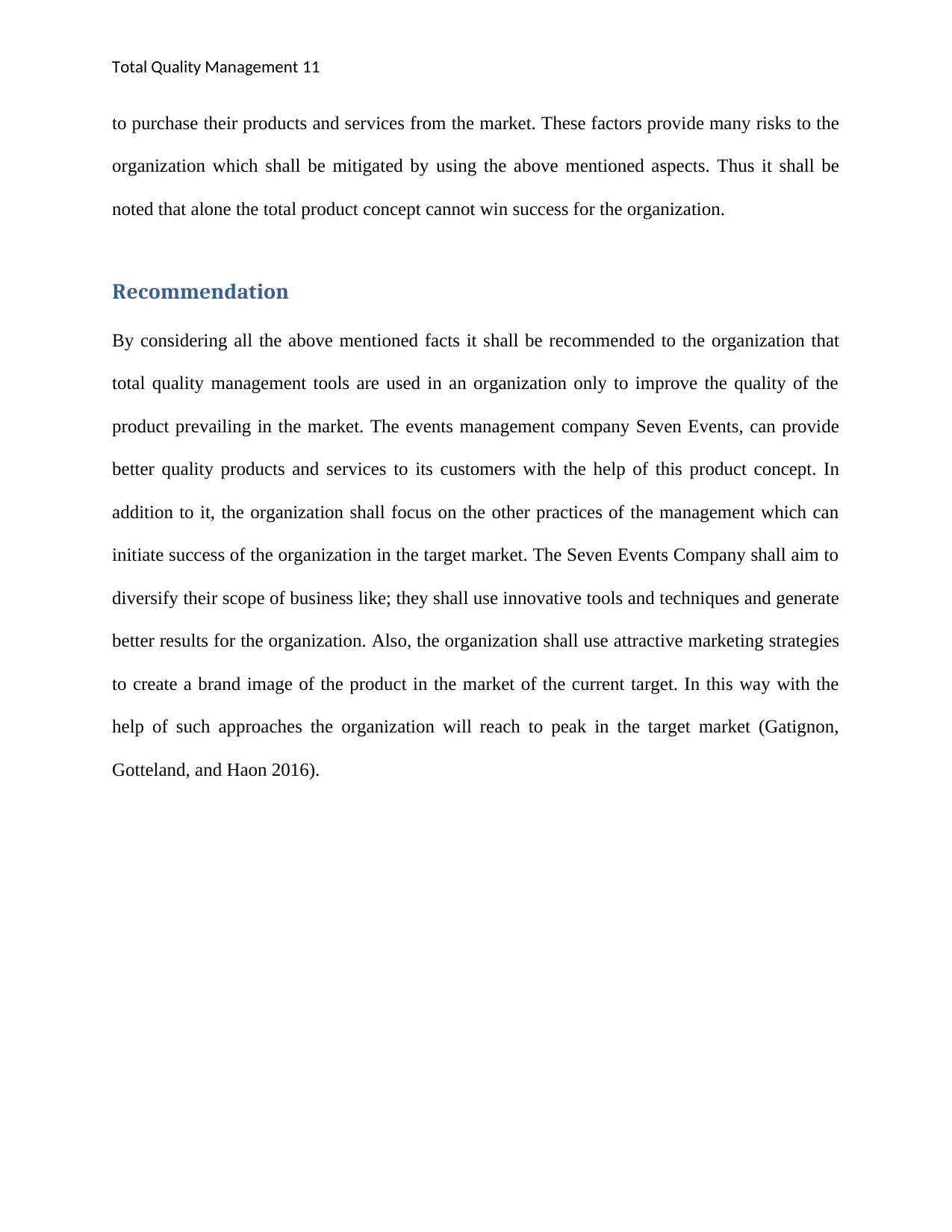
Total Quality Management 11
to purchase their products and services from the market. These factors provide many risks to the
organization which shall be mitigated by using the above mentioned aspects. Thus it shall be
noted that alone the total product concept cannot win success for the organization.
Recommendation
By considering all the above mentioned facts it shall be recommended to the organization that
total quality management tools are used in an organization only to improve the quality of the
product prevailing in the market. The events management company Seven Events, can provide
better quality products and services to its customers with the help of this product concept. In
addition to it, the organization shall focus on the other practices of the management which can
initiate success of the organization in the target market. The Seven Events Company shall aim to
diversify their scope of business like; they shall use innovative tools and techniques and generate
better results for the organization. Also, the organization shall use attractive marketing strategies
to create a brand image of the product in the market of the current target. In this way with the
help of such approaches the organization will reach to peak in the target market (Gatignon,
Gotteland, and Haon 2016).
to purchase their products and services from the market. These factors provide many risks to the
organization which shall be mitigated by using the above mentioned aspects. Thus it shall be
noted that alone the total product concept cannot win success for the organization.
Recommendation
By considering all the above mentioned facts it shall be recommended to the organization that
total quality management tools are used in an organization only to improve the quality of the
product prevailing in the market. The events management company Seven Events, can provide
better quality products and services to its customers with the help of this product concept. In
addition to it, the organization shall focus on the other practices of the management which can
initiate success of the organization in the target market. The Seven Events Company shall aim to
diversify their scope of business like; they shall use innovative tools and techniques and generate
better results for the organization. Also, the organization shall use attractive marketing strategies
to create a brand image of the product in the market of the current target. In this way with the
help of such approaches the organization will reach to peak in the target market (Gatignon,
Gotteland, and Haon 2016).
⊘ This is a preview!⊘
Do you want full access?
Subscribe today to unlock all pages.

Trusted by 1+ million students worldwide
1 out of 15
Related Documents
Your All-in-One AI-Powered Toolkit for Academic Success.
+13062052269
info@desklib.com
Available 24*7 on WhatsApp / Email
![[object Object]](/_next/static/media/star-bottom.7253800d.svg)
Unlock your academic potential
Copyright © 2020–2026 A2Z Services. All Rights Reserved. Developed and managed by ZUCOL.





